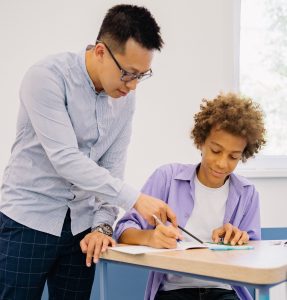What Is Self-Advocacy?
 Most people have some idea of what “self-advocacy” is, but it helps to define it. At its heart, self-advocacy is the ability to communicate what your needs are. Read more ›
Most people have some idea of what “self-advocacy” is, but it helps to define it. At its heart, self-advocacy is the ability to communicate what your needs are. Read more ›
 Most people have some idea of what “self-advocacy” is, but it helps to define it. At its heart, self-advocacy is the ability to communicate what your needs are. Read more ›
Most people have some idea of what “self-advocacy” is, but it helps to define it. At its heart, self-advocacy is the ability to communicate what your needs are. Read more ›
 Teenagers need 8 to 10 hours of sleep each night to be at their best, but few get anywhere near that amount. That’s often due to factors outside their control, like school hours and homework levels.
Teenagers need 8 to 10 hours of sleep each night to be at their best, but few get anywhere near that amount. That’s often due to factors outside their control, like school hours and homework levels.
Many schools have been taking notice — and making changes to promote teen sleep. Read more ›
 Learning a foreign language can be frustrating for a student with a language-based learning disability. Many of the same elements that may have posed problems in English (letter sounds, decoding, spelling, grammar), can cause difficulties in foreign language learning. Read more ›
Learning a foreign language can be frustrating for a student with a language-based learning disability. Many of the same elements that may have posed problems in English (letter sounds, decoding, spelling, grammar), can cause difficulties in foreign language learning. Read more ›
 Many students are considering taking time away from school to tend to their mental health — and it is something that should be encouraged, experts say. Still, navigating those waters may be intimidating. Here’s what mental health experts in academia recommend. Read more ›
Many students are considering taking time away from school to tend to their mental health — and it is something that should be encouraged, experts say. Still, navigating those waters may be intimidating. Here’s what mental health experts in academia recommend. Read more ›
 We often think of learning differences as challenges faced in school. But the reality is that learning differences impact people throughout their lives with implications far beyond the classroom: home, relationships, work and family to name a few. Therefore, it’s important to learn strategies and skills that apply throughout the lifespan. Read more ›
We often think of learning differences as challenges faced in school. But the reality is that learning differences impact people throughout their lives with implications far beyond the classroom: home, relationships, work and family to name a few. Therefore, it’s important to learn strategies and skills that apply throughout the lifespan. Read more ›
 Support from schools can improve elementary and secondary students’ math, reading, and other language skills. But how can people with learning disabilities prepare for the demands of university or working life? Read more ›
Support from schools can improve elementary and secondary students’ math, reading, and other language skills. But how can people with learning disabilities prepare for the demands of university or working life? Read more ›
 Being a child or teen with a learning disability can be challenging and frustrating, especially if the learning disability goes undetected. It is important to understand the symptoms one might experience at different ages and get children and teens the proper assistance they require at school. Read more ›
Being a child or teen with a learning disability can be challenging and frustrating, especially if the learning disability goes undetected. It is important to understand the symptoms one might experience at different ages and get children and teens the proper assistance they require at school. Read more ›
 In its simplest definition, dyslexia is a developmental learning disorder that makes it difficult to read and write. Though it’s typically diagnosed in childhood, symptoms can go unrecognized until later in life and extend well beyond letter mixups. Read more ›
In its simplest definition, dyslexia is a developmental learning disorder that makes it difficult to read and write. Though it’s typically diagnosed in childhood, symptoms can go unrecognized until later in life and extend well beyond letter mixups. Read more ›
 Text-to-speech software is often a vital resource for students with dyslexia—to aid reading, promote comprehension, and enhance overall literacy skills. Here are 10 helpful text-to-speech software and applications that are great assistive technology tools to have at the start of the school year. Read more ›
Text-to-speech software is often a vital resource for students with dyslexia—to aid reading, promote comprehension, and enhance overall literacy skills. Here are 10 helpful text-to-speech software and applications that are great assistive technology tools to have at the start of the school year. Read more ›
 Understanding and supporting a 2e students’ social-emotional needs is essential to their well-being. It is important for parents and school staff to develop 2e students’ strengths while supporting areas of need.
Understanding and supporting a 2e students’ social-emotional needs is essential to their well-being. It is important for parents and school staff to develop 2e students’ strengths while supporting areas of need.
Read more ›